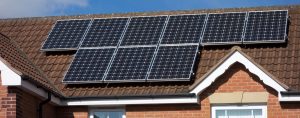Two-thirds of homeowners plan green upgrades, but cost still stands in the way
Posted by: electime 22nd September 2025
- 65 per cent of UK homeowners plan to make green home improvements in the next decade.
- Top planned features include EV chargers (34 per cent), solar panels (34 per cent), triple glazing (33 per cent), and heat pumps (26 per cent).
- Insulation is the top buyer priority, with 33 per cent calling double glazing “essential” and 36 per cent saying it’s “very important.”
- Approximately 25 per cent planned to make improvements in the next 12 months in Q2, a record high.
- Cost is the main barrier for nearly three-quarters (74 per cent) of those without plans; 38 per cent also cite reluctance to take on debt, and 32 per cent disruption from work.
 Two-thirds (65 per cent) of UK homeowners plan to make green home improvements within the next decade, according to new research from NatWest’s Greener Homes Attitude Tracker. The most popular planned features cited by respondents include EV chargers (34 per cent), solar panels (34 per cent), triple glazing (33 per cent) and heat pumps, with more than a quarter (26 per cent) expecting to install a heat pump within ten years.
Two-thirds (65 per cent) of UK homeowners plan to make green home improvements within the next decade, according to new research from NatWest’s Greener Homes Attitude Tracker. The most popular planned features cited by respondents include EV chargers (34 per cent), solar panels (34 per cent), triple glazing (33 per cent) and heat pumps, with more than a quarter (26 per cent) expecting to install a heat pump within ten years.
Insulation tops buyer priorities, with one-third (33 per cent) calling double glazing “essential” and 36 per cent saying it is “very important.” A property’s Energy Performance Certificate (EPC) rating remains very important to 42 per cent of buyers, though it now marginally ranks below local green space (43 per cent) and access to public transport (43 per cent), in a change from the findings of the second report of 2024. The latest survey of 9,000 UK adults shows a significant rebound in plans for green upgrades in the first half of 2025 compared to late 2024, despite ongoing financial pressures. The rise comes amid increased housing supply and renewed government focus on building more homes and raising energy standards, with proposals under consideration for Minimum Energy Efficiency Standards in social housing.
Approximately 25 per cent of homeowners surveyed between April to June 2025 indicated plans to make green improvements within the next 12 months, a record high. Immediate plans include composting bins (10 per cent), smart energy meters (9 per cent) and rainwater harvesting systems (9 per cent).
Beyond home upgrades, wider lifestyle changes are on the rise, with 72 per cent of adults surveyed reducing food waste, 62 per cent minimising home energy use, and the use of electric or hybrid vehicle rising to 11 per cent, up from 9 per cent a year earlier.
The research also reveals a clear income divide. Among households earning under £23,000 a year, just 53 per cent have a ten-year green upgrade plan, compared to 78 per cent of those earning over £57,750. Higher earners are around twice as likely to have short-term improvement plans.
Cost, however, remains the overall main hurdle, cited by nearly three-quarters (74 per cent) of homeowners without upgrade plans. A reluctance to take on debt (38 per cent) is a major barrier, as are the disruption from the work (32 per cent) and limited financing options (27 per cent). For almost one in five (18 per cent), the type of property they live in prevents them from making green changes.
Lloyd Cochrane, Head of Mortgages at NatWest Group, said:
“It’s promising to see that two-thirds of UK homeowners now have long-term plans to improve the environmental sustainability of their homes, but the research clearly shows that cost remains a significant barrier. Our challenge is to ensure these improvements are as accessible and affordable as possible.”
“We are committed to supporting our customers in making their homes more energy-efficient through a range of products and services, including the NatWest Home Energy Hub. We want to help households make informed choices that are right for their homes, budgets, and futures.”


